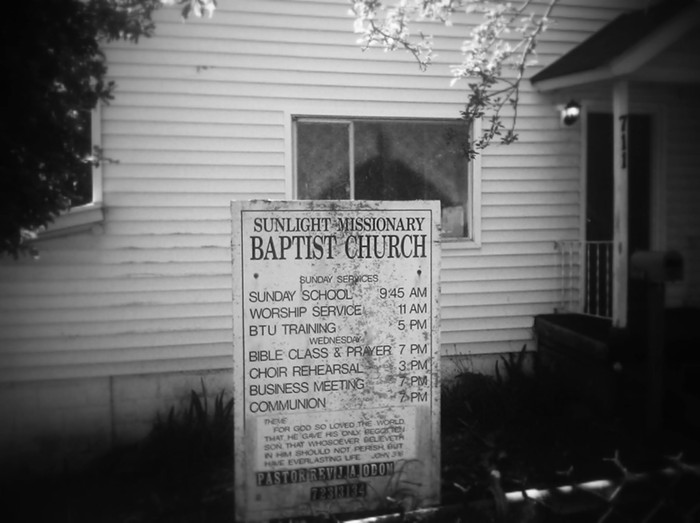
Senator Emily Randall has to walk past 64 years of history to get to her office in the Washington State Capitol. The hallway that winds its way to Randall’s spot is lined with photos of former Washington state legislative assemblies, from 1889 to where her door stops at 1952. The majority of the senators are (obviously) white, straight, wealthy, and male, but I notice there’s at least some diversity in their style: ridiculous mustaches in the late 19th century, slick hair in the ‘20s, the crisp suits of the ‘50s. All seem to monitor me as I pass by them.
Randall’s office itself reflects a different history. The bookshelf of the senator representing Washington’s 26th district, which covers the southeastern swath of the Kitsap Peninsula, is lined with books like Audre Lorde’s Zami: A New Spelling of my Name and Virginia Woolf’s Orlando. There’s a bright neon poster of a quote by feminist scholar bell hooks: “The practice of love is the most powerful antidote to the politics of domination.” And there are fruit snacks on the front desk. Randall’s office, like her fellow freshman Senator Joe Nguyen's office, seems to physically embody a change to the Legislature—a step forward, perhaps.
“Anytime I'm like, ‘Oh, this is how we do things,’ [Randall] always has an ‘OK, so why do we do these things?’ which is really fun,” Randall’s legislative assistant Sarah Myers told me. It’s her third session at the Capitol, having worked for both Sen. Rolfes and Sen. Ranker previously.
“That’s why she decided to bring me on board,” continued Myers, who is sometimes referred to as “Google” by other Randall staffers because of her deep knowledge of how things run in Olympia. “I’ve been in different offices and she was like, ‘I want someone that knows what’s going on but will join me in pushing back where we can and changing things that we need to.’”
Sometimes “changing things that we need to” involves bringing lawn chairs to the Capitol. The senator semi-famously bought lawn chairs and set them out underneath the cherry blossom trees that surround the Legislative Building, thinking stressed out legislators and aides could enjoy the blooming flowers. They were promptly confiscated by the grounds staff.
Randall is the first openly queer woman to be elected to the state Senate. She won the purple-ish 26th district in a nail-biter: After a manual recount, just 102 votes separated Randall and her opponent, conservative Christian AM radio show host, real estate agent, and general bag of hot air Marty McClendon, a Republican with a long history of losing. Randall ran on issues like access to health care and making higher education affordable to everyone. And it worked.
Her victory was one of the many victories in state elections last year that sent progressive and diverse first-time candidates to the state Senate, lawmakers such as Senators Mona Das, Joe Nguyen, and Claire Wilson. Randall calls working with this cohort of newbies “the best part of the job.” They have constant text chains and meet up roughly every Thursday to unwind and offload the stresses of what it’s like to be a minority in government.

“When [the Legislative Building] was built it was not built expecting people who come from families like mine and Joe's and Mona's, that we would work in those halls,” Randall told me recently over the phone. I couldn’t help but think of the long line of senator portraits I had to pass to get to her office. “It's inspiring that we now serve in the most diverse Legislature in the state's history, that this new chapter under the dome has been opened.”
She admits that it still feels very strange to be talking about hunger, people being unable to pay their rent or afford their mounting medical bills in this very fancy and impressive building in Olympia. “The disparity between the gilded dome and what it's like to be a working-class person struggling to make it in Washington—that's really discordant."

We are meant to venerate, be humbled by this monument to government—there’s a reason why the 49 senators and 98 representatives do not congregate in some office park in Tukwila. Every material and architectural design in the Legislative Building is meant to reinforce the importance of the work these citizen legislators do. And also to serve as a reminder of who exactly it was built for.
Randall comes from a long line of veterans and union workers. She was raised in the same Port Orchard home her mother was raised in. After her grandfather served in World War II, her mother’s family moved to Washington from Texas in the mid-50s to work at a shipyard in Bremerton for the Department of Defense.
Her paternal grandfather similarly served in the military (as a Marine in the Korean War) and moved his family to Bremerton after working as a sheet metal worker in Utah. Her dad’s family is Chicano. She told me he faced a lot of discrimination before moving to the Pacific Northwest.
“He was training people who were promoted over him, they faced housing discrimination,” Randall told me. “My grandparents wanted to move out of a community that they felt stifled in because of racial tension, so they moved to Washington state to find a more welcoming community for their family, to raise their kids in. So, they moved to Bremerton in 1967.” Randall lives there now, with her partner.
“It felt like I had been given so much from my grandparents and my parents and my neighbors, financial aid and health care," Randall continued. "So, I wanted to give back.”
Though Randall won the election, there’s a lingering perception that the 26th is still somewhat conservative, and that some of her more progressive values run counter to the wishes of the people she represents. It’s a military stronghold after all. I asked her if, as a progressive candidate that holds down several different identities (queer, Latina, millennial, first-generation college graduate), if she ever felt like she had to compromise in terms of how progressive she could actually be.

“I think the work of being a legislator is compromising, because we don’t share every single value with every single one of our neighbors,” she told me. “I think that the conception that our district has been more moderate, more conservative was based on years with pretty low turnout. And we saw a huge turnout, some of the highest turnout of any district around the state and our community.”
It’s true. In the 2018 election for 26th district state senate seat, over 33,000 ballots were cast in Kitsap County—10,000 more than in the previous election cycle in 2014, where the Republican Jan Angel trounced the Democratic opposition by more than 15 points. Randall believes she won because she felt like she “spoke to some of their values that had been long ignored.”
“Senate Bill 5398 to the front!”
I’m standing next to two of Senator Randall’s session aides in the belly of the Legislative Building in Olympia. We’re outside the governor’s quarters, waiting for Governor Jay Inslee’s assistant to call two of Randall’s bills to be signed into law.
There’s a whole mess of people outside the door: politicians, interested parties, legislative aides, anti-vaxxers with their at-risk children in tow. Everything’s marble, too; the floor, the ceiling, the walls, the bathroom doors. Sounds ricochet off the material. It feels tomb-like. Impenetrable. I’m constantly worried I’ll slip and chip my front tooth on these squeaky floors designed to remind me of their greatness.
One of the aides I’m standing next to, Kali Chargualaf, has a clipboard with a list of bills to be signed by the Governor. “Just a couple more,” she leans over to tell me.

An hour earlier I’d been waiting in the Democratic wing of the Senate floor, on the plusher and more forgiving dogwood-decorated carpeting—a weird contrast against all that marble. It was the cutoff day to pass bills from the opposite house. Senators and aides were running back and forth, talking to each other, waiting around. It was hectic; the feeling was heavy, like everyone was carrying the weight of their constituents.
Randall was at her seat on the Senate floor multitasking on two different cell phones, talking into one and texting on the other. The senators were considering and discussing House Bill 1394, a bill concerning community facilities for behavioral health patients, and about to break to go to caucus. She breezed past me, still on the phone— “I’ve got to talk to some doctors!”—and walked into the caucus room.
Randall spent a lot of her career working in health care. She cites her time and involvement in queer organizing at Wellesley College (we are both alumnae, although we did not attend the school at the same time) as foundational to her approach to fighting for health care access, particularly for the LGBTQ community.
The senator was also very much shaped by her own personal experience—her younger sister, Olivia, was born with microcephaly, a condition where a person’s head is much smaller than normal. There are no known cures for microcephaly and doctors had no idea how long Olivia would live.
But the same year as her sister was born, the Washington Legislature voted to expand Medicaid, which allowed her family to qualify and get the coverage needed to ensure that Olivia could live a happy life at home. Randall told me that as a little girl she saw that “government could be a really powerful tool for good in people’s lives.”
“Those are the values that I brought to the Legislature,” she said. “That’s who I’m here to fight for: folks who often have been left behind, whose issues are less convenient.”

In her first year, Randall has led the charge on the Pathway to Universal Health Care bill, a piece of legislation that would study and recommend to the Legislature various forms of state-based single-payer health care. The idea being to have a concrete roadmap to universal health care here in Washington. Despite having bipartisan support, the bill didn’t pass, but its substance was included as a proviso in the budget with funding. A small victory, but something to build off of.
Not including two bills already signed into law, Randall has two fully passed bills on the governor’s desk, waiting to be signed. One outlines a pilot program to provide assistance for homeless college students at community and technical colleges. The other is a reproductive health care bill she sponsored banning discriminatory barriers to reproductive health care based on gender identity.
“I heard such compelling testimony in committee and in conversations with advocates and allies about the reality of trans folks who are denied access to the care that they need, whose insurance claims are denied, whose doctors don’t see them and won’t treat them,” said Randall. “I think it was really important.”
Randall is the first openly queer woman to serve in the state Senate—a fact that has been a source of confusion as her colleague, Sen. Wilson, is a lesbian. This distinction might feel trivial to some but represents a larger cultural divide between generations and identities.
“There has been a lot of education. I have colleagues that ask me, ‘What does [queer] mean?’ so I explain to them, that I feel like, as we recognize that gender is a spectrum, I don't identify as bisexual because I think that creates a dichotomy. Queer just feels more reflective of me and my experience and my life.”
Running and legislating as an openly queer person leads to some pretty awkward moments on the floor. Like, for example, when Sen. Wilson called herself the first openly lesbian woman to be elected to the Senate during a committee hearing, presiding Sen. Sam Hunt’s face apparently contorted into a giant question mark, looking at Randall, who was seated just behind Wilson. Isn’t there another gay in the room?
Randall, up right after Wilson, generously clarifies queerness to the senators.
“I identify as a queer woman," Randall explains, "which means that while I have been in a very long relationship with my partner Alison, should I be separated and get married again, there’s no limit to the gender of the person that I might be in another relationship with."
I feel for Randall. It’s like having to explain to your grandpa’s golfing buddy who you like to bone and why. It’s a constant coming out and explaining of self that straight people aren’t burdened with. Google, in fact, exists—even in the Legislative Building! The Wi-Fi signal isn’t strong, but it’s there.
For her part, Randall handled it all with grace, managing to loop the discussion back to the importance of the bill she was there to talk about. Being queer is "true for a lot of members of our community—including our veterans," she concludes in her speech to Hunt.
“Being asked about your identity and being asked to explain yourself can be off-putting to some people,” Sen. Marko Liias, who serves on the higher education committee and is a member of the LGBT caucus along with Randall, said to me over the phone recently. During Randall’s first couple of weeks in the Legislature, she had a dozen conversations with colleagues—Democrats and Republicans alike—about what queer means.
“I think she approached it with a real ‘teachable moment’ attitude,” Liias tells me. “Like, ‘This is a moment to really educate and help advance our shared mission of a more equitable and shared society,’—which I thought was really powerful.”
The legislative session officially ended last Sunday. The 105 days go by in a whirlwind—next year our state government will only meet for a 60-day cycle. As a first-time candidate, Randall admitted that she didn’t have a good idea about what the day-to-day would be like as a state senator.
“I knew that my community had unmet healthcare needs, and unmet higher education needs, and that we needed a voice in the Senate who would advocate for infrastructure. Because our community has just been overlooked for so long,” she told me. “So those things—those are issues I’ve worked on every day of session.”
Next year, she says she’s coming to sink her teeth into even more issues: fighting for the new ferries that her district needs, making improvements to Washington’s health care system and working towards universal and more affordable health care coverage, especially for the LGBTQ community and women.
“I feel proud of the accomplishments we've made and, like any young, overachieving woman, I'm creating a longer and longer list of things that I'm going to do better next year,” she says with a serious laugh. “Because this is not a one-time shot: this is an ongoing commitment to making sure that everyday people have a voice for them.”
“Senate Bill 5622 to the front, please!”
That’s us. Randall reappears, dressed in a bright blue dress and large gold hoops (I have the exact same pair) and shakes everyone’s hands.

“It’s my first bill to be signed,” she tells the group of us, which has been expanded to include various judges and court commissioners who advocated for this bill to be passed. “How auspicious,” someone pipes up. We’re ushered through a small (marble) antechamber and into a larger waiting area, the walls of which are covered with painted portraits of Washington governors past. Isaac Stevens, the first governor of the Washington Territory, stares down on us all. (Stevens was notoriously bloodthirsty, a man who—through intimidation and force—compelled local indigenous groups to cede their territory to his government.)
“All right, they’re ready for you now.” Another aide guides our crew through the last door and into a cavernous room with a long desk. Inslee sits in a large chair at the end of the table. The group huddles around the governor who reads the bill, congratulates Randall, and, with a few quick flicks of the wrist, signs the bill into law. Everyone claps. We all get commemorative pens. They are very inky.
As we exit into the rotunda, I lean back to take in the massive dome and its tall, oppressive columns. I think of a fact I learned from a Slog commenter: The dome is fake. Well, parts of it are, at least. The upper-level columns that look like marble are actually plaster, colored to imitate the real marble found in other parts of the building. The Capitol's impenetrability is softer, more pliable than it seems. If you look closely, its grandest columns reveal themselves to be rudimentary, like they're wrapped in wallpaper that needs to be retouched.
















